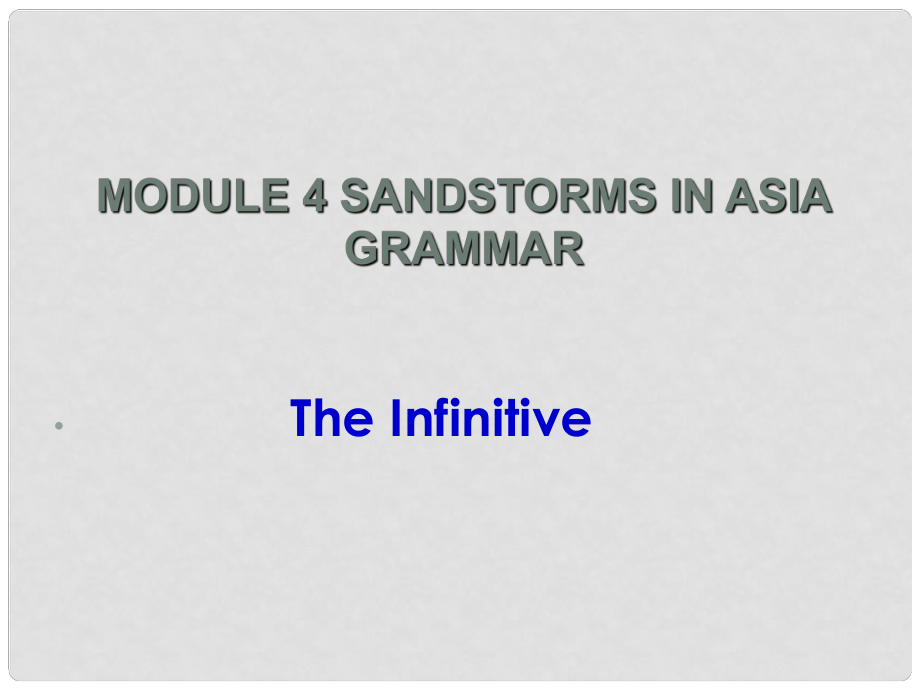《山東省淄博市淄川般陽中學(xué)高中英語《Module 4 Sandstorms in Asia》課件3 外研版必修3》由會員分享�����,可在線閱讀�����,更多相關(guān)《山東省淄博市淄川般陽中學(xué)高中英語《Module 4 Sandstorms in Asia》課件3 外研版必修3(21頁珍藏版)》請?jiān)谘b配圖網(wǎng)上搜索�����。
1���、 The Infinitive學(xué)習(xí)目標(biāo):學(xué)習(xí)和掌握本模塊語法學(xué)習(xí)目標(biāo):學(xué)習(xí)和掌握本模塊語法-動詞不定式動詞不定式 的用法�����;完成有關(guān)練習(xí)�;的用法�;完成有關(guān)練習(xí);學(xué)習(xí)重點(diǎn):掌握不定式的句法功能�,并能加以運(yùn)用。學(xué)習(xí)重點(diǎn):掌握不定式的句法功能,并能加以運(yùn)用�。學(xué)習(xí)難點(diǎn):不定式作主語,狀語學(xué)習(xí)難點(diǎn):不定式作主語�,狀語學(xué)法指導(dǎo):通過觀察文章出現(xiàn)的不定式,獨(dú)立思考�����,學(xué)法指導(dǎo):通過觀察文章出現(xiàn)的不定式�����,獨(dú)立思考�����, 組內(nèi)討論���、對比,總結(jié)歸納重點(diǎn)用法組內(nèi)討論���、對比�,總結(jié)歸納重點(diǎn)用法 【學(xué)情調(diào)查�、情景導(dǎo)入學(xué)情調(diào)查、情景導(dǎo)入】1. 不定式的時態(tài)和語態(tài)�����。不定式的時態(tài)和語態(tài)。形式形式主動形式主動形式被動形式被動形式一般式一
2�、般式進(jìn)行式進(jìn)行式完成式完成式完成進(jìn)行式完成進(jìn)行式to have been doingto be doneto be doingto have doneto doto have been done 2. 他似乎在外面站了一個多小時了。他似乎在外面站了一個多小時了���。 He seems _ outside for more an hour. 3. 據(jù)說小明正在學(xué)開車�。據(jù)說小明正在學(xué)開車�����。Xiao Ming is said _ to drive these days. 4. 人們普遍認(rèn)為是貝爾發(fā)明了電話���。人們普遍認(rèn)為是貝爾發(fā)明了電話�����。 People generally consider Bell _
3���、the telephone. 6. We had nothing to do but _ (wait).to have been standingto be learningto have inventedwait2. 作業(yè)一作業(yè)一3. 不定式在句中所作成分。不定式在句中所作成分���?����!締栴}展示�、合作探究問題展示、合作探究】 觀察下列課文中出現(xiàn)的句子�,說出不定式所作成分。觀察下列課文中出現(xiàn)的句子�,說出不定式所作成分。 1 Scientists have tried many ways to solve this problem and in China, a mass campaign has b
4���、een started to help solve it. 2 They are often so thick that you cannot see the sun, and the wind is sometimes strong enough to move sand dunes. 3 To have been caught in a sandstorm was a terrible experience. 4 There was nothing to be done. 目的狀語目的狀語賓語賓語結(jié)果狀語結(jié)果狀語主語主語定語定語 5 Sandstorms in China appear t
5���、o have increased in recent years as a result of “desertification”. 6 The storms sometimes continue all day and traffic moves very slowly because the think dust makes it difficult to see. 7. When a sandstorm arrives in the city, weather experts advise people not to go out. 8 To be cycling in a sandst
6、orm is frightening. 表語表語賓語賓語賓補(bǔ)賓補(bǔ)主語主語 9 Its difficult to breathe and the dust makes me ill. 10 So if you want to go out, youd better wear a mask. 11 To prevent it coming nearer, the government is planting trees. 12 Already the government has planted more than 30 billion trees and plans to continue pl
7�����、anting for the next five years. 主語主語賓語賓語目的狀語目的狀語賓語賓語總結(jié):不定式在句中所作成分 1. 主語主語 a. To have been caught in a sandstorm was a terrible experience. b. To be cycling in a sandstorm is frightening. c. Its difficult to breathe and the dust makes me ill. 練習(xí):練習(xí): 學(xué)好英語很重要���。學(xué)好英語很重要。_ =It is very important _To learn E
8�、nglish well is very important.to learn English well. 2. 賓語賓語 a. Scientists have tried many ways to solve this problem and in China, a mass campaign has been started to help solve it. b. The storms sometimes continue all day and traffic moves very slowly because the think dust makes it difficult to s
9、ee. c. So if you want to go out, youd better wear a mask. d. Already the government has planted more than 30 billion trees and plans to continue planting for the next five years. 練習(xí):練習(xí): We planned _(give) a concert next month. 提示:后常跟不定式作賓語的動詞:提示:后常跟不定式作賓語的動詞:plan, manage, want, refuse, decide, offer
10、, fail, agree, etc.to give 3. 表語表語 Sandstorms in China appear to have increased in recent years as a result of “desertification”. 練習(xí):練習(xí): 她的工作是照看這些孩子���。她的工作是照看這些孩子�����。 Her job is _.to look after these children 4. 賓語補(bǔ)足語賓語補(bǔ)足語 When a sandstorm arrives in the city, weather experts advise people not to go out.
11�����、 練習(xí):練習(xí): 老師要同學(xué)們按時上交作業(yè)�。老師要同學(xué)們按時上交作業(yè)�。 The teacher asked the students _ on time.to hand in their homework提示:感官動詞提示:感官動詞feel, hear, see, watch, notice; 使役動詞使役動詞have, make, let后常用省略后常用省略to 的不定的不定式作賓語補(bǔ)足語。式作賓語補(bǔ)足語�����。 我剛剛看到凱特進(jìn)了教室�����。我剛剛看到凱特進(jìn)了教室�。_ 凱特剛剛被看到進(jìn)了教室。凱特剛剛被看到進(jìn)了教室�。_ 湯姆經(jīng)常使他妹妹哭�����,但這次被他妹妹弄哭了�����。湯姆經(jīng)常使他妹妹哭�����,但這次被他妹妹弄哭了�。
12�����、 Tom often makes his sister _, but this time he is made _ by her.I saw Kate enter the classroom just now.Kate was seen to enter the classroom just now. cryto cry 5. 定語 There was nothing to be done. 練習(xí):練習(xí): The meeting _ (hold) tomorrow is very important. 明天要舉行的會議很重要���。明天要舉行的會議很重要���。to be held 6. 狀語 Scien
13、tists have tried many ways to solve this problem and in China, a mass campaign has been started to help solve it. They are often so thick that you cannot see the sun, and the wind is sometimes strong enough to move sand dunes. To prevent it coming nearer, the government is planting trees. 練習(xí):練習(xí): 表目的
14���、表目的 為了趕上火車���,杰克今天早上很早就起床了。為了趕上火車�,杰克今天早上很早就起床了。 _, Jack got up very early this morning. 為了起強(qiáng)調(diào)作用�,常用為了起強(qiáng)調(diào)作用,常用In order to, so as to結(jié)構(gòu)���,其中結(jié)構(gòu)�����,其中so as to不能用于句首�����。不能用于句首�����。To catch the train 表結(jié)果�����,常與表結(jié)果�����,常與only 連用�,構(gòu)成連用,構(gòu)成only to do 結(jié)構(gòu)�,結(jié)構(gòu),表示出乎意料的結(jié)果���。表示出乎意料的結(jié)果�。 他去看望他的叔叔�����,結(jié)果被告知他已經(jīng)搬走了���。他去看望他的叔叔�����,結(jié)果被告知他已經(jīng)搬走了�。 He went to visi
15�����、t his uncle only _ that he had moved away. 我們匆匆趕到機(jī)場,結(jié)果發(fā)現(xiàn)飛機(jī)已經(jīng)起飛了�。我們匆匆趕到機(jī)場,結(jié)果發(fā)現(xiàn)飛機(jī)已經(jīng)起飛了�。 We hurried to the airport, _ the plane had taken off. to be toldonly to find【達(dá)標(biāo)檢測、歸納總結(jié)達(dá)標(biāo)檢測�、歸納總結(jié)】 用下列不定式的適當(dāng)形式完成下列短文���。用下列不定式的適當(dāng)形式完成下列短文�����。 to go to college, in order to succeed, to share, to make a living, to make, to a
16�����、ccept his ideas There was a time in ancient China when there were a great many great philosophers (哲學(xué)家)���,(哲學(xué)家), one of whom was Su Qin. At that time, it was hard for the philosophers _. _, Su Qin studied very hard. Finally he managed six states(國家)(國家)_ and thus got very famous. From this we can see,
17�����、 if your aim is _, you should learn from Su Qin. Do you have anything else _ about Su Qin? If any, tell us next time. to make a livingIn order to succeedto makeaccept his ideasgo to collegeto share【知識梳理�、歸納總結(jié)知識梳理�、歸納總結(jié)】 不定式的用法 1 不定式的時態(tài)和語態(tài)不定式的時態(tài)和語態(tài)2 不定式在句中所作成分不定式在句中所作成分【預(yù)習(xí)指導(dǎo)�、新課鏈接預(yù)習(xí)指導(dǎo)、新課鏈接】 預(yù)習(xí)內(nèi)容:預(yù)習(xí)內(nèi)容:1 自學(xué)自學(xué)Module 5 單詞單詞 2 預(yù)習(xí)課文預(yù)習(xí)課文 3 完成預(yù)習(xí)完成預(yù)習(xí)學(xué)案學(xué)案 預(yù)習(xí)重點(diǎn):預(yù)習(xí)學(xué)案重點(diǎn)短語及句子預(yù)習(xí)重點(diǎn):預(yù)習(xí)學(xué)案重點(diǎn)短語及句子 預(yù)習(xí)方法:先自學(xué)單詞�����,預(yù)習(xí)課文�,獨(dú)立完成預(yù)習(xí)學(xué)案,預(yù)習(xí)方法:先自學(xué)單詞���,預(yù)習(xí)課文�����,獨(dú)立完成預(yù)習(xí)學(xué)案�����,遇到問題與同學(xué)討論或查找資料�����,不能解決的先作好標(biāo)遇到問題與同學(xué)討論或查找資料�����,不能解決的先作好標(biāo)記���,課上解決�。記�,課上解決。
 山東省淄博市淄川般陽中學(xué)高中英語《Module 4 Sandstorms in Asia》課件3 外研版必修3
山東省淄博市淄川般陽中學(xué)高中英語《Module 4 Sandstorms in Asia》課件3 外研版必修3

